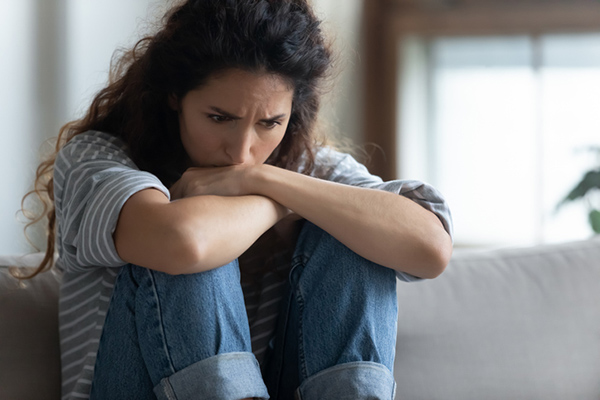Summary: October is Domestic Violence Awareness Month. Domestic violence is more than just physical violence. This guide shares resources to help domestic violence survivors in Virginia. Learn how to identify domestic abuse and access support through hotlines, text lines, online chats, housing aid, shelters, and healthcare providers.
October is Domestic Violence Awareness Month. During this month, we celebrate the progress we’ve made and the courage of domestic violence survivors. The goal is to share domestic violence resources with women who need them. This dedicated outreach forges connections to ensure every woman has access to the help she needs.
Domestic violence is a major public health issue that impacts across all races, religions, and cultures. One in three women will experience intimate partner violence in her lifetime. That’s equal to about 10 million individuals per year.
In Virginia, 31.3% of women have reported such experiences. However, there are still many women struggling in silence.
Domestic violence is not limited to physical violence. The first step toward safety is identifying what domestic violence looks like in yourself or those close to you. We’ve created this guide to provide accessible resources for victims of domestic violence in Virginia. Continue reading to gain access to the support you need to pursue safety.
Identifying Domestic Violence
It is hardest to identify abuse while you’re experiencing it. That’s especially true if it comes from someone you love and trust.
In the state of Virginia, domestic violence is legally referred to as “family abuse.” It refers to abuse involving a current or former family or household member.
Who is considered a family or household member? This term includes a spouse, regardless of residence; an ex-spouse, regardless of residence; parents, stepparents, children, stepchildren, brothers sisters, half-brothers, half-sisters, grandparents, and grandchildren, regardless of residence; persons who have a child in common regardless of residence; in-laws who live in the same home; co-habitants; and those who have cohabited in the past year and their children.
The term “domestic violence” is used when a family or household member causes, attempts to cause, or threatens to cause another person injury or physical harm, severe emotional distress, psychological trauma, rape, or sexual assault. The definition also includes the acts of stalking, false imprisonment, or causing or attempting to cause damage to property in order to intimidate or attempt to control a person.
A Broader Understanding: Domestic Violence vs. Domestic Abuse
Most people believe domestic violence is purely physical violence. You might picture the stereotypical battered woman. However, domestic violence does not always leave bruises and does not look like one thing.
Using the term “domestic abuse” can help to broaden the focus from physical violence to the many forms of abuse encompassed by domestic violence. This shift in terminology can help those who are suffering – as well as the professionals who provide support – to recognize the non-physical forms of domestic violence as well as the physical abuse.

Domestic abuse can take the following forms:
- Online abuse: Including excessive online monitoring (demanding passwords to private accounts, reading your private email communication, etc). It also includes cyberbullying or distributing explicit photos or videos without consent.
- Financial abuse: Controlling or limiting access to money or economic resources, causing dependency on the abuser.
- Verbal abuse: Extreme exploitation of insecurities, emotional manipulation, or threats that influence behavior.
- Mental abuse: Including stalking behavior, social isolation, gaslighting, or generally instilling ongoing fear.
- Physical abuse: This goes beyond physical violence. Withholding health resources, including food, medication, or mobility aids, is also physical abuse.
- Sexual abuse: Any sexual act performed without your willing consent is sexual abuse. This also includes certain acts of sexual voyeurism.
Since domestic abuse can take on so many different forms, it’s important to trust your instincts. If you feel something is not right, you deserve help. Begin with the domestic violence resources below.
Resources for Victims of Domestic Violence
Below, we’ve gathered resources on domestic violence by resource type.
Domestic Abuse Hotline
If using your phone is safe, you can begin by reaching out to the National Domestic Violence Hotline at 800-799-7233. They are available 24 hours a day, and all calls are confidential. They can put you in touch with local resources.
Domestic Abuse Text Line
If you would feel safer texting, you can reach the Virginia Sexual and Domestic Violence Action Alliance at 804-793-9999. This 24/7 resource is multi-lingual and safe for those experiencing abuse in LGBTQ+ relationships.
Domestic Abuse Online Chat
You can also chat online with domestic abuse advocates. Some women find it safest to access these resources at a local library. One resource is the Love Is Respect online chat service. They offer accessible services for the Deaf, Native American populations, and more.
Domestic Violence Moving Assistance
Leaving an abusive partner often means leaving your residence. Often, women do not have the financial resources to secure safe new housing. That is one of the most common reasons women stay in abusive relationships.
Many counties in Virginia offer victims of domestic violence assistance with housing. They employ economic support specialists who can explain your rights and assist you during this process. They maintain lists of affordable housing options in the county where you live.
You can access individual county websites through the Virginia Association of Counties.
Find a Women’s Shelter in Virginia
Virginia Sexual And Domestic Violence Action Alliance maintains a database of women’s shelters by locality. You can search their database online. You’ll see the closest women’s shelters to your area, including their websites and phone numbers.
Receive Emergency Medical Care
A visit to the hospital after a domestic violence incident can feel as traumatic as the incident itself. If you require emergency medical care after experiencing domestic violence, there is a specially trained team of forensic nurses and victim services advocates who can help. The Bon Secours Violence Response Team is available 24/7. You can visit any Bon Secours’ emergency department to receive the medical care, emotional support, and resources you need.
The forensic nurse and advocate understand the emotional trauma and physical pain you may be feeling and are there to support you. The team can provide comprehensive care including specialized medical attention, evidence collection, emotional support, advocacy support, hospital accompaniment, follow-up phone calls, and referrals for community resources.
Help for Domestic Violence Begins at the Doctor’s Office
Reaching out to a domestic abuse hotline can sometimes feel like a big step. If a partner is tracking your phone, it may even be impossible. Often, it’s easier and safer to reach out to someone you already know: your women’s health provider.
Did you know that all physicians are considered mandated reporters? They have a legal responsibility to connect you with the resources you need. In some circumstances, they may be one of the few individuals you can safely speak to alone.
Often, your doctor can be your first confidant as you navigate the search for support. Women’s health professionals are particularly astute at noticing the signs of domestic violence. Though subtle, they build screenings into their exam. Even a simple question like “Are you experiencing any pain?” can start a conversation. We also have ways of speaking with you privately if a partner has accompanied you to your appointment.
If you are worried about an abuser seeing something in your medical records, let your physician know. They have ways to conceal this information without omitting it. They aim to provide safe assistance for abused women and will put your security first.
You’re safe with the caring and compassionate providers at VPFW. Schedule an appointment at one of our Richmond, VA gynecology offices today to get the resources you need to thrive.
